-
 Tech sector's energy transition draws attention at Vegas show
Tech sector's energy transition draws attention at Vegas show
-
Five things to know about New Glenn, Blue Origin's new rocket
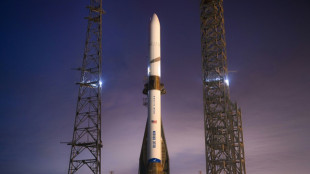
-
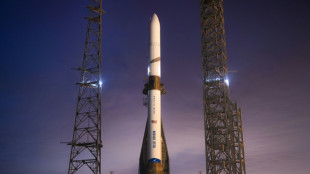 Blue Origin set for first launch of giant New Glenn rocket
Blue Origin set for first launch of giant New Glenn rocket
-
Dutch police detain hundreds at climate protest

-
 Germany battles to secure stricken 'Russian shadow fleet' oil tanker
Germany battles to secure stricken 'Russian shadow fleet' oil tanker
-
Malala Yousafzai 'overwhelmed and happy' to be back in Pakistan

-
 'Education apartheid': schooling in crisis in Pakistan
'Education apartheid': schooling in crisis in Pakistan
-
Smart glasses enter new era with sleeker designs, lower prices

-
 Supreme Court looks poised to uphold TikTok ban
Supreme Court looks poised to uphold TikTok ban
-
2024 hottest recorded year, crossed global warming limit

-
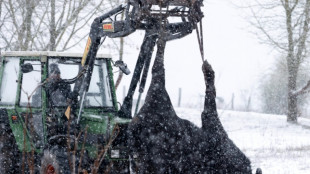 Germany reports foot-and-mouth disease in water buffalo
Germany reports foot-and-mouth disease in water buffalo
-
US hikes reward for Maduro arrest after 'illegitimate' swearing-in

-
 Robots set to move beyond factory as AI advances
Robots set to move beyond factory as AI advances
-
Pro-Russian disinformation makes its Bluesky debut

-
 UK gas reserves 'concerningly low', warns biggest supplier
UK gas reserves 'concerningly low', warns biggest supplier
-
2024 warmest year on record for mainland US: agency

-
 Meta policy reversal puts question mark on future of fact-checking
Meta policy reversal puts question mark on future of fact-checking
-
Meta policy reversal puts question mark on furure of fact-checking

-
 Strong US jobs report sends stocks sliding, dollar rising
Strong US jobs report sends stocks sliding, dollar rising
-
US hiring beats expectations in December to cap solid year

-
 UK gas reserves 'concerningly low': Biggest supplier
UK gas reserves 'concerningly low': Biggest supplier
-
Global stocks mostly fall before US jobs data

-
 Ubisoft: the 'Assassin's Creed' maker targeted by suitors
Ubisoft: the 'Assassin's Creed' maker targeted by suitors
-
Stock markets drift lower as US jobs data looms

-
 Pakistan flight departs for Paris after EU ban lifted
Pakistan flight departs for Paris after EU ban lifted
-
Nobel laureate Malala Yousafzai to visit native Pakistan for girls' summit
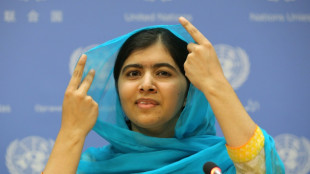
-
 AI comes down from the cloud as chips get smarter
AI comes down from the cloud as chips get smarter
-
Tajikistan bets on giant dam to solve electricity crisis

-
 Uruguay bucks 2024 global warming trend
Uruguay bucks 2024 global warming trend
-
Last 2 years crossed 1.5C global warming limit: EU monitor

-
 Japan 'poop master' gives back to nature
Japan 'poop master' gives back to nature
-
US Supreme Court to hear TikTok ban case

-
 US Fed's December rate cut should be its last for now: official
US Fed's December rate cut should be its last for now: official
-
Paris Hilton among celebrities to lose homes in LA fires
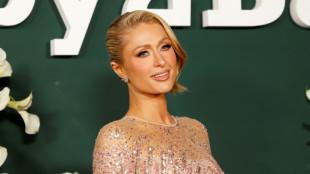
-
 Airbus boosts plane deliveries in 2024
Airbus boosts plane deliveries in 2024
-
Ubisoft reviews restructuring options, postpones new Assassin's Creed

-
 Lamborghini sets new sales record amidst hybrid push
Lamborghini sets new sales record amidst hybrid push
-
Lebanon army chief Aoun becomes president after two-year vacancy

-
 US emissions stagnated in 2024, challenging climate goals: study
US emissions stagnated in 2024, challenging climate goals: study
-
Lebanon army chief short of required majority in first round of president vote

-
 Global stock markets mixed tracking US rates outlook
Global stock markets mixed tracking US rates outlook
-
Lebanon meets to finally elect president after two-year vacancy

-
 Celebrities flee Los Angeles fires, lose houses as Hollywood events scrapped
Celebrities flee Los Angeles fires, lose houses as Hollywood events scrapped
-
Japan startup hopeful ahead of second moon launch

-
 Ukraine allies to hold last defence meet before Trump takes office
Ukraine allies to hold last defence meet before Trump takes office
-
Myanmar military adopts anti-junta fighters' drone tactics

-
 CES tech looks to help world's aging population
CES tech looks to help world's aging population
-
Rubber tappers forge sustainable future in Amazon

-
 US astronauts upbeat seven months into eight-day mission
US astronauts upbeat seven months into eight-day mission
-
Extreme weather, suburban sprawl fuel LA's wildfires
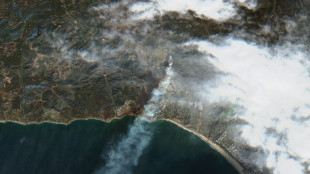
| BCC | -1.31% | 115.88 | $ | |
| SCS | -3.01% | 10.97 | $ | |
| RELX | -0.86% | 46.37 | $ | |
| RBGPF | 100% | 60.49 | $ | |
| NGG | -3.3% | 56.13 | $ | |
| GSK | -1.99% | 33.09 | $ | |
| CMSC | -0.79% | 22.92 | $ | |
| CMSD | -0.65% | 23.25 | $ | |
| BCE | -2.92% | 22.96 | $ | |
| RIO | 0.36% | 58.84 | $ | |
| AZN | 0.64% | 67.01 | $ | |
| BTI | -2.34% | 35.9 | $ | |
| BP | 0.54% | 31.29 | $ | |
| JRI | -1.16% | 12.08 | $ | |
| RYCEF | -0.42% | 7.07 | $ | |
| VOD | -1.99% | 8.05 | $ |
Alice Weidel: AfD Chancellor Candidate 2025
At the party conference in Riesa (Saxony), AfD politician Alice Weidel (45) was nominated by her party as the chancellor candidate for the federal election on 23 February 2025 and enjoys great popularity among some of the voters in the Federal Republic of Germany. Within the party, she represents a conservative and economically liberal wing that has gained additional influence in recent months as the AfD's poll numbers have risen.
Current surveys show that the AfD (Alternative for Germany) has been able to significantly expand its presence in some German states and can continue to do so. As of 11 January 2025, the party stands at 22 per cent – which would leave the CDU/CSU with only an eight per cent lead. In this, the chancellor candidate Alice Weidel benefits from her rhetorical strength and her clear positioning on migration, the economy and, in particular, EU policy. However, the question remains whether Weidel has a realistic chance of becoming chancellor.
To become Chancellor, Weidel and the AfD would need either an absolute majority in the Bundestag or coalition partners. So far, the other parties in Germany categorically rule out working with the AfD. However, should the political system shift and the AfD continue to gain influence in the future, Weidel, as the leading candidate, could well find herself in a position to form a government – similar to the one currently held by the FPÖ (Freedom Party of Austria) in Austria with Herbert Kickl.
The coming months and years will show whether Weidel's popularity can grow beyond certain voter groups and whether she will remain a long-term figurehead within the AfD. Meanwhile, the newly-elected chancellor candidate Alice Weidel attacked the CDU in her first speech and proclaimed a duel between the AfD and the CDU in the federal election. Weidel referred to a recent INSA poll: the CDU is at 30 per cent, while the AfD is climbing to 22 per cent – its highest level in a year. Only eight points now separate the parties.

EU: Tariffs on all Chinese electric Cars

Zelenskyy: ‘What worked in Israel work also in Ukraine’

Electric car crisis: Future of a Audi plant?

Vladimir Putin, War criminal and Dictator of Russia

EU vs. Hungary: Lawsuit over ‘national sovereignty’ law

Ukraine: Zelenskyy appeals for international aid

Lebanon: Is a new wave of refugees coming to the EU?

Terrorist state Iran attacks Israel with missiles

Belarus: ICC investigates dictator Lukashenko

NATO: Ukraine ‘at the top of the list!’

NATO is training to fight cyber attacks




